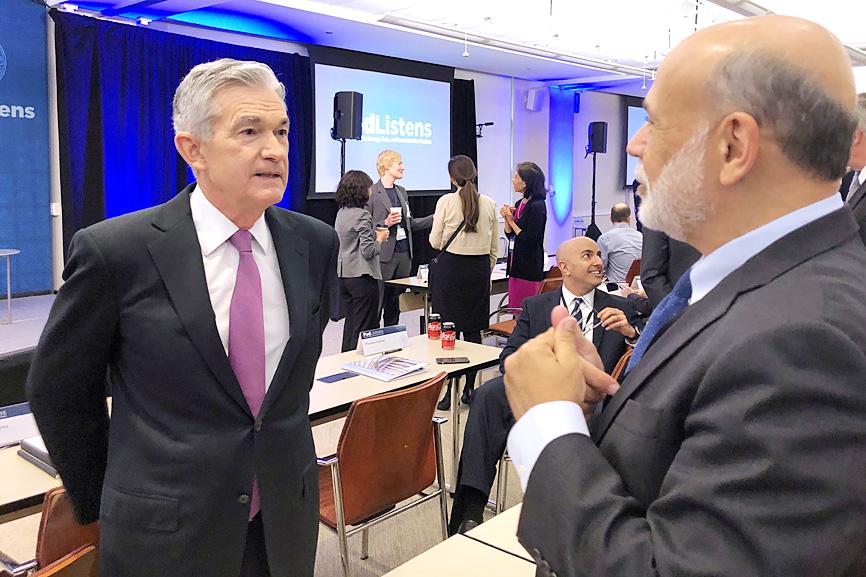US Federal Reserve Chairman Jerome Powell on Tuesday said that the US economy has been permanently changed by the COVID-19 pandemic and it is important that the central bank adapts to those changes.
“We’re not simply going back to the economy that we had before the pandemic,” Powell said at a Fed virtual town hall for educators and students. “We need to watch carefully as the economy continues to get through the pandemic, and try to understand the ways that the economy has changed and what the implications are for our policy.”
While it is not yet clear if the Delta variant of SARS-CoV-2 would have further impact on the economy, the US has already seen significant changes since the pandemic began shutting the country down in March last year, he said.

Photo: Reuters
Those changes range from the increase in remote work, to restaurants offering more take-out meals, to real-estate agents learning to show homes virtually, he said.
Many companies have already made large investments in technology to adapt to the challenges that the pandemic has presented.
“It seems a near certainty that there will be substantially more remote work going forward,” Powell said. “That’s going to change the nature of work and the way work gets done.”
Powell said the heavy investment by companies in new technology means there would be more jobs in the future associated with maintaining that technology, but also potential job losses in industries focused on in-person contact.
Some of those industries might be moving to an “automated, no-contact model,” he added.
This trend is already showing up in the jobs data, with the recovery slower in industries that rely on public interaction, such as travel, leisure and hospitality.
Those are jobs disproportionately held by women and people of color, and typically pay lower wages, Powell said.
“It may be that some of these people will have a harder time finding their way back into the workforce without more education and training,” he said.
There are millions of people who have lost service sector jobs and remain out of work, and need to be supported, he said.
“That’s a part of the recovery that’s far from complete,” he said.
The pandemic could turn out to be a historical inflection point that would allow the current generation of students to turn the lessons learned into “profound tools of change,” he said.
Students who have lived through the pandemic will see the world differently, he said.
“You have seen a world upended, but you have also seen a world that is rapidly changing — sometimes more in one week than some of us have experienced over the course of decades,” he said.
“This is an extraordinary time and I believe that it will result in an extraordinary generation,” he said.
The town hall is an event started by former Fed chairman Ben Bernanke and continued by former Fed chair and now US Secretary of the Treasury Janet Yellen. It seeks to highlight the importance of classes in economics.

South Korea’s equity benchmark yesterday crossed a new milestone just a month after surpassing the once-unthinkable 5,000 mark as surging global memory demand powers the country’s biggest chipmakers. The KOSPI advanced as much as 2.6 percent to a record 6,123, with Samsung Electronics Co and SK Hynix Inc each gaining more than 2 percent. With the benchmark now up 45 percent this year, South Korea’s stock market capitalization has also moved past France’s, following last month’s overtaking of Germany’s. Long overlooked by foreign funds, despite being undervalued, South Korean stocks have now emerged as clear winners in the global market. The so-called “artificial intelligence

‘SEISMIC SHIFT’: The researcher forecast there would be about 1.1 billion mobile shipments this year, down from 1.26 billion the prior year and erasing years of gains The global smartphone market is expected to contract 12.9 percent this year due to the unprecedented memorychip shortage, marking “a crisis like no other,” researcher International Data Corp (IDC) said. The new forecast, a dramatic revision down from earlier estimates, gives the latest accounting of the ongoing memory crunch that is affecting every corner of the electronics industry. The demand for advanced memory to power artificial intelligence (AI) tasks has drained global supply until well into next year and jeopardizes the business model of many smartphone makers. IDC forecast about 1.1 billion mobile shipments this year, down from 1.26 billion the prior

NEW IDENTITY: Known for its software, India has expanded into hardware, with its semiconductor industry growing from US$38bn in 2023 to US$45bn to US$50bn India on Saturday inaugurated its first semiconductor assembly and test facility, a milestone in the government’s push to reduce dependence on foreign chipmakers and stake a claim in a sector dominated by China. Indian Prime Minister Narendra Modi opened US firm Micron Technology Inc’s semiconductor assembly, test and packaging unit in his home state of Gujarat, hailing the “dawn of a new era” for India’s technology ambitions. “When young Indians look back in the future, they will see this decade as the turning point in our tech future,” Modi told the event, which was broadcast on his YouTube channel. The plant would convert

People stand in a Pokemon store in Tokyo on Thursday. One of the world highest-grossing franchises is celebrated its 30th anniversary yesterday.